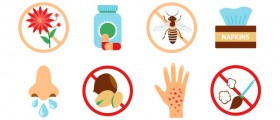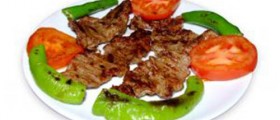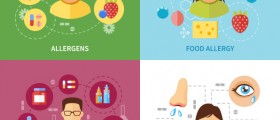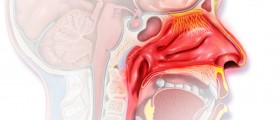
Any food intolerance is often misinterpreted as an allergy to food. Whenever there is a reaction to food people tend to think it is an allergy. However, food poisoning and intolerance to certain substances (such as to milk lactose) also present reactions to food. Food allergy is a hypersensitive and adverse reaction of the immune system to food with recognizable symptoms.
However, some reactions to food seems to be similar to food allergy. Food intolerance has similar symptoms and is more common, but here this is not a reaction of the immune system, rather of a different organ and body mechanism and reactions. Food intolerance can also be the symptom of various diseases.
Every person can develop an allergy to food some time in their life. On average, only three percent of adults and up to eight percent of children have undergone tests for proving allergic reactions to food. In order to confirm food allergy a person has to do the adequate tests. Food allergy has to be treated since untreated allergies may lead to serious health problems.
Some food substances trigger off allergic reactions. Proteins from the food gets into the blood and thus the organs which react to them. Proteins get into the blood because they are tolerable to the stomach acids and enzymes responsible for food digestion. Once the blood and organs are affected,the immune system start counter reaction. Immune system sends an antibody immunoglobulin E into the blood and the mast cell, an essential part of all tissues especially in the nose, throat, skin, lungs, intestines.
Genes also play an important role here since the genes are transmitted from one family member to another. If the allergies appear often in the family, it is possible that a child will get one from his parents. Any allergy can be passed this way (to pollen, feathers, drugs).
When a person is exposed to allergens in food, these allergens incite the white blood cells which produce immunoglobulin antibody. This immunoglobulin attach to the mast cells and whenever a person eats food the cells produce histamine, responsible for allergic reaction.
Symptoms of a food allergy appear a few minutes to hour after eating the specific food. First symptoms are itchy mouth, difficult breathing and swallowing. After this, a person may experience vomiting, diarrhea, upsetting stomach and dizziness. Allergens in the blood can also cause rash or eszema on the skin and if they affect the breathing organs they cause asthma.
Allergens are responsible for lowering the blood pressure, which makes a person feel weak and nauseous with tingling sensations. If this reaction occurs, a person should be treated immediately so as to avoid further health complications.

















Your thoughts on this
Loading...